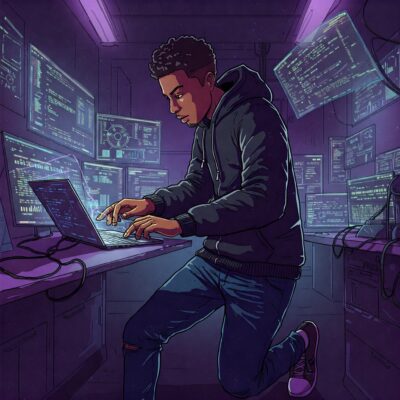Ethical hackers, also known as penetration testers, identify vulnerabilities in computer systems and networks, helping organizations strengthen their cybersecurity defenses.
What is a typical day as an Ethical Hacker?
– Conducting simulated cyberattacks to uncover system vulnerabilities.
– Analyzing security protocols and suggesting improvements to prevent potential breaches.
– Preparing detailed reports on security assessments and recommended fixes.
– Staying updated on the latest cyber threats and hacking techniques.
What else might they be expected to do?
– Collaborate with IT teams to implement security measures and software patches.
– Train employees on recognizing and preventing phishing or malware attacks.
– Participate in cybersecurity incident response and recovery.
What type of training is needed for this career path?
– A degree in Cybersecurity, Computer Science, or Information Technology is advantageous.
– Certifications like Certified Ethical Hacker (CEH) or Offensive Security Certified Professional (OSCP) are essential.
What kind of personality is needed to excel in this career path?
– Analytical, detail-oriented, and problem-solving individuals thrive in this role.
– Big 5 traits: Openness and Conscientiousness.
– Myers-Briggs types: INTJ or ISTP align well with this career.
What challenges can I expect to face if I pursue this career path?
– Keeping up with rapidly evolving hacking techniques and technologies.
– Managing the high-pressure environment of time-sensitive security testing.
– Balancing technical expertise with the ability to communicate findings to non-technical stakeholders.
What are the job prospects for this path in Kenya and Africa? What about International prospects for a Kenyan citizen?
– Kenya and Africa: Growing demand in financial institutions, government agencies, and private organizations as cybercrime increases.
– International: High demand in multinational corporations, cybersecurity firms, and government defense agencies.
What should I focus on if I choose to pursue this career?
– Develop strong skills in network security, programming, and risk analysis.
– Gain hands-on experience through cybersecurity challenges or internships.
– Stay informed about global cybersecurity trends and threats.
Which other careers or job roles can I progress to?
– Cybersecurity Analyst
– Information Security Manager
– Security Consultant
– Chief Information Security Officer (CISO)

